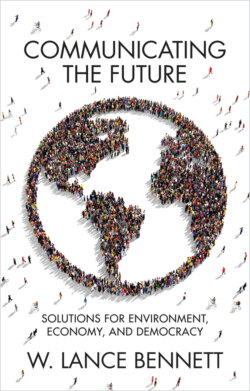Communicating the Future

Реклама. ООО «ЛитРес», ИНН: 7719571260.
Оглавление
W. Lance Bennett. Communicating the Future
Table of Contents
List of Illustrations
Guide
Pages
Dedication
Communicating the Future. Solutions for Environment, Economy, and Democracy
Copyright Page
Acknowledgments
Introduction: The Future is Now
Notes
Overview of the Book
1 Communicating Complex Problems
Language vs. Reality: Avoiding Solutions that Perpetuate Problems
Life in an Age of Magical Thinking
How Everyday Communication Logic Affects Thinking About Change
Recognize That the Future Starts Now
Be Careful with Categories
Learn to Think at the Intersection of Categories
Avoid Backwards Thinking that Gets Us Working the Wrong Ends of Problems
Notice How Facts and Values Are Used Selectively to Support Each Other
Think Critically about “Being Realistic”
Using Communication Logics to Decode Everyday Communication
Why So Much Everyday Communication Is Unhelpful
Imagining a Different World
The Politics Problem
The Idea-Flow Framework
Idea Production
Packaging Ideas
Networking Ideas
Political Uptake
Notes
2 What’s Missing in Environmental Communication?
Why Ideas Matter
The Fragmentation of Ideas in the Modern Environmental Movement
Competing Sources of Idea Production
Better Packaging for Alarms than Solutions
The Weak Networking of Environmental Ideas
The Limited Political Uptake of Real Solutions
The Pitfalls of Sustainable Development
Notes
3 Economy vs. Environment: Selling Predatory Economics
The Idea of Endless Growth
The Rise of Neoliberal Free-Market Mania
The Production of Neoliberal Ideas
Packaging Neoliberalism
Networking Neoliberalism
Political Uptake
The Problem of Post-Democracy
Notes
4 Democracy with a Future: Mobilizing Ideas and Opportunities for Change
The Political Future at a Crossroads
Some Political Lessons from the Rise of Neoliberalism
Lesson 1: The Coordinated Production of Alternative Ideas
Lesson 2: Packaging Ideas for Change
Lesson 3: Networking the Spread of Ideas
Lesson 4: Political Uptake and Institutional Embedding of Ideas and Values
Lesson 5: Taking Advantage of Political Opportunities
Seizing Opportunities for Change
Notes
5 Communicating Change: Attention, Amplification, and Organization
Making Sure the Contents Suit the Packaging
Shifting Attention to (Simpler) Ideas about Economic Change
Setting the Stage for Change: A Mindset for Developing Better Ideas
How Change Happens: Power, People, and Government
A Place to Start: What’s the Economy For?
Making the Idea-Flow Model Work
Improving Idea Production
Idea Packaging
Networking Ideas for Change
Political Uptake
Conclusion
Notes
Index
POLITY END USER LICENSE AGREEMENT
Отрывок из книги
For Oliver
Although the book is short in length, it reflects a long and wonderful journey in which I have been enlightened by many people. Many of the ideas here have been informed by exchanges with students and colleagues at the University of Washington, where, over the years, we created a number of learning communities to think about how better to align environment, economy, and democracy. An early project involved John de Graaf, Tim Jones, and dozens of students to explore the question: What’s the Economy For? This is also the title of a book and film by John, who is one of my favorite renaissance people. Shortly after that, along came Deric Gruen, community activist and organizer extraordinaire, who helped me develop the Rethinking Prosperity project with students, community leaders, and progressive funders. Among other things, we learned a lot about how community organizations and funders can greatly improve (or unwittingly undermine) the capacity and sustainability of their programs for change.
.....
To aid the reader’s thinking about building more effective models of political communication, the book shows how other transformative ideas have traveled in society and into politics. For example, Chapter 3 traces the origins and spread of the core principles of the currently dystopian economic system of global, deregulated, and ecologically predatory capitalism. The current economic operating systems in most nations will continue to defeat efforts to treat the multiplying environmental symptoms until coalitions of different stakeholders develop and implement more attractive alternatives. The aim is to show how those already concerned about the future can develop ideas about more equitable and ecologically sound societies and organize more effective politics to guide the transitions.
A place to start is with assessing the ever-expanding lists of specific issues that do not add up to a compelling vision for change: save the polar bears, stop oil drilling in the Arctic, protect the old growth forests, quit mining coal, stop burning the Amazon, tax carbon, build more renewable energy, and on and on. As our failing economic and political practices create more and more problems, it is easy to understand why so much energy is focused on trying to deal with them all. However, as noted earlier, the politics attached to all of that issue-specific communication generally ends up fighting the symptoms of an economic system that spews more new problems than any amount of issue-by-issue action can fix. Moreover, all of those worthy causes compete against each other for attention, empathy and action.
.....